
Donald Henry Rumsfeld was an American politician, government official and businessman who served as secretary of defense from 1975 to 1977 under President Gerald Ford, and again from 2001 to 2006 under President George W. Bush. He was both the youngest and the oldest secretary of defense. Additionally, Rumsfeld was a four-term U.S. Congressman from Illinois (1963–1969), director of the Office of Economic Opportunity (1969–1970), counselor to the president (1969–1973), the U.S. Representative to NATO (1973–1974), and the White House Chief of Staff (1974–1975). Between his terms as secretary of defense, he served as the CEO and chairman of several companies.

Tommy Ray Franks is a retired United States Army general. His last army post was as the Commander of the United States Central Command, overseeing United States military operations in a 25-country region, including the Middle East. Franks succeeded General Anthony Zinni to this position on 6 July 2000 and served until his retirement on 7 July 2003. Franks was the United States general leading the attack on the Taliban in Afghanistan in response to the September 11 attacks on the World Trade Center and The Pentagon in 2001. He also oversaw the 2003 invasion of Iraq and the overthrow of Saddam Hussein.

The 2003 invasion of Iraq was the first stage of the Iraq War. The invasion began on 20 March 2003 and lasted just over one month, including 26 days of major combat operations, in which a United States-led combined force of troops from the United States, the United Kingdom, Australia and Poland invaded the Republic of Iraq. Twenty-two days after the first day of the invasion, the capital city of Baghdad was captured by coalition forces on 9 April after the six-day-long Battle of Baghdad. This early stage of the war formally ended on 1 May when U.S. President George W. Bush declared the "end of major combat operations" in his Mission Accomplished speech, after which the Coalition Provisional Authority (CPA) was established as the first of several successive transitional governments leading up to the first Iraqi parliamentary election in January 2005. U.S. military forces later remained in Iraq until the withdrawal in 2011.
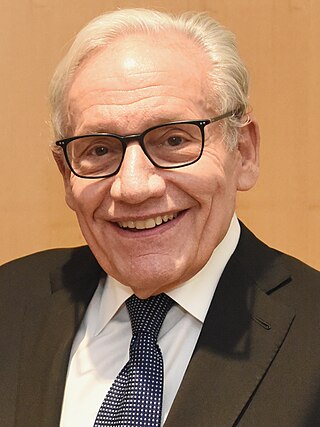
Robert Upshur Woodward is an American investigative journalist. He started working for The Washington Post as a reporter in 1971 and now holds the honorific title of associate editor though the Post no longer employs him.

Seymour Myron Hersh is an American investigative journalist and political writer. He gained recognition in 1969 for exposing the My Lai massacre and its cover-up during the Vietnam War, for which he received the 1970 Pulitzer Prize for International Reporting. During the 1970s, Hersh covered the Watergate scandal for The New York Times, also reporting on the secret U.S. bombing of Cambodia and the Central Intelligence Agency's (CIA) program of domestic spying. In 2004, he detailed the U.S. military's torture and abuse of prisoners at Abu Ghraib in Iraq for The New Yorker. Hersh has won a record five George Polk Awards, and two National Magazine Awards. He is the author of 11 books, including The Price of Power: Kissinger in the Nixon White House (1983), an account of the career of Henry Kissinger which won the National Book Critics Circle Award.
The Office of Special Plans (OSP), which existed from September 2002 to June 2003, was a Pentagon unit created by Paul Wolfowitz and Douglas Feith, and headed by Feith, as charged by then–United States Secretary of Defense Donald Rumsfeld, to supply senior George W. Bush administration officials with raw intelligence pertaining to Iraq. A similar unit, called the Iranian Directorate, was created several years later, in 2006, to deal with intelligence on Iran.
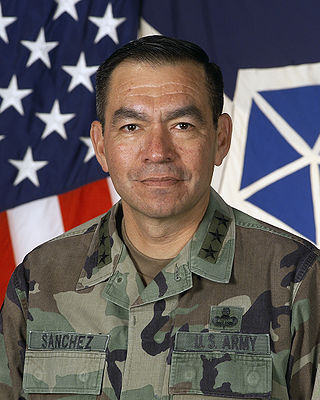
Ricardo Sanchez is a former lieutenant general in the United States Army.

The Price of Loyalty: George W. Bush, the White House, and the Education of Paul O'Neill is a 2004 book by Pulitzer Prize-winning author Ron Suskind. The book was the first to provide critical insight into the events that led up to the Iraq War. The Price of Loyalty was met with both commercial and critical success, and was the first book by Suskind to be a #1 New York Times best-seller.

Lawrence Rush "Rick" Atkinson IV is an American author, most recently of The British Are Coming: The War for America, Lexington to Princeton, 1775–1777, the first volume in the Revolution Trilogy. He has won Pulitzer Prizes in history and journalism.

A Bright Shining Lie: John Paul Vann and America in Vietnam (1988) is a book by Neil Sheehan, a former New York Times reporter, about U.S. Army lieutenant colonel John Paul Vann and the United States' involvement in the Vietnam War.

Fred M. Kaplan is an American author and journalist. His weekly "War Stories" column for Slate magazine covers international relations and U.S. foreign policy.

Lawrence B.Wilkerson is a retired United States Army Colonel and former chief of staff to United States Secretary of State Colin Powell.

Dana Louise Priest is an American journalist, writer and teacher. She has worked for nearly 30 years for the Washington Post and became the third John S. and James L. Knight Chair in Public Affairs Journalism at the University of Maryland's Philip Merrill College of Journalism in 2014. Before becoming a full-time investigative reporter at the Post, Priest specialized in intelligence reporting and wrote many articles on the U.S. "War on terror" and was the newspaper's Pentagon correspondent. In 2006 she won the Pulitzer Prize for Beat Reporting citing "her persistent, painstaking reports on secret "black site" prisons and other controversial features of the government's counter-terrorism campaign." The Washington Post won the 2008 Pulitzer Prize for Public Service, citing the work of reporters Priest and Anne Hull and photographer Michel du Cille "exposing mistreatment of wounded veterans at Walter Reed Hospital, evoking a national outcry and producing reforms by federal officials."
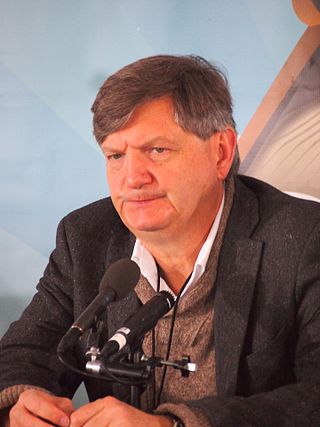
James Risen is an American journalist for The Intercept. He previously worked for The New York Times and before that for Los Angeles Times. He has written or co-written many articles concerning U.S. government activities and is the author or co-author of two books about the Central Intelligence Agency (CIA) and a book about the American public debate about abortion. Risen is a Pulitzer Prize winner.

The Iraq War, also referred to as the Second Gulf War, was a prolonged conflict in Iraq lasting from 2003 to 2011. It began with the invasion by a United States-led coalition, which resulted in the overthrow of the Ba'athist government of Saddam Hussein. The conflict persisted as an insurgency arose against coalition forces and the newly established Iraqi government. US forces were officially withdrawn in 2011. In 2014, the US became re-engaged in Iraq, leading a new coalition under Combined Joint Task Force – Operation Inherent Resolve, as the conflict evolved into the ongoing insurgency.

Thomas Edwin "Tom" Ricks is an American journalist and author who specializes in the military and national security issues. He is a two-time winner of the Pulitzer Prize for National Reporting as part of teams from the Wall Street Journal (2000) and Washington Post (2002). He has reported on U.S. military activities in Somalia, Haiti, Korea, Bosnia, Kosovo, Macedonia, Kuwait, Turkey, Afghanistan, and Iraq. He previously wrote a blog for Foreign Policy and is a member of the Center for a New American Security, a defense policy think tank.

State of Denial: Bush at War, Part III (ISBN 0-7432-7223-4) is a 2006 book by Bob Woodward that examines how the George W. Bush administration managed the Iraq War after the 2003 invasion. It follows Woodward's previous books on the Bush administration, Bush at War and Plan of Attack. Based on interviews with a number of people in the Bush administration, the book makes a number of allegations about the administration.

Douglas Ollivant is a Senior National Security Studies Fellow at the New America Foundation as well as a Managing Partner at Mantid International. Ollivant previously served as a senior counterinsurgency (COIN) advisor to Regional Command East, as part of the International Security Assistance Force COIN Advisory and Assistance Team. He served as Director for Iraq on the National Security Council under the Bush and Obama administrations. A retired U.S. Army officer, he served two tours in the Iraq War, first as the operations officer for the First Battalion, Fifth Cavalry Regiment during OIF II and later as the Chief of Plans for Multi-National Division-Baghdad during the “Surge”, leading the team which wrote the Baghdad Security Plan.
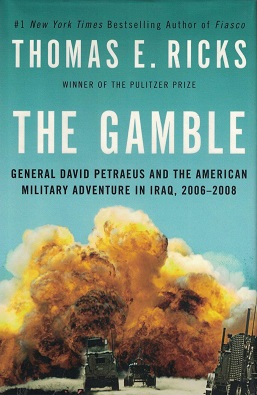
The Gamble: General David Petraeus and the American Military Adventure in Iraq, 2006–2008 is a 2009 book by journalist Thomas E. Ricks about the Iraq War. It covers the 2006–2008 period where his last book Fiasco left off. A primary focus is the Iraq War troop surge of 2007, along with the ascension to command of Gen. David Petraeus and the change in approach of Gen. Ray Odierno towards the use of counter-insurgency strategies. Ricks believes that the troop surge was successful in reducing violence in Iraq and "reviv[ing] American prospects in the war," but that it was a failure based on its initial goal of bringing about a political reconciliation in Iraq.
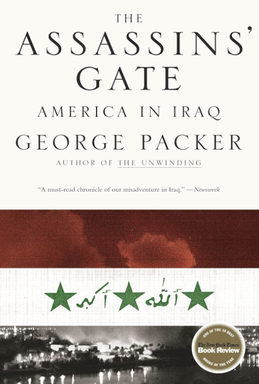
The Assassins' Gate: America in Iraq is a non-fiction book detailing the 2003 U.S. invasion of Iraq and its aftermath by American journalist George Packer, otherwise best known for his writings in The New Yorker. He published the work through Farrar, Straus & Giroux in 2005. Packer stated that the whole project became a bungled mess with American officials in the George W. Bush administration cherry-picking intelligence to support their positions, as well as being unable to respond to military issues such as insufficient troops, armor, and supplies.


















